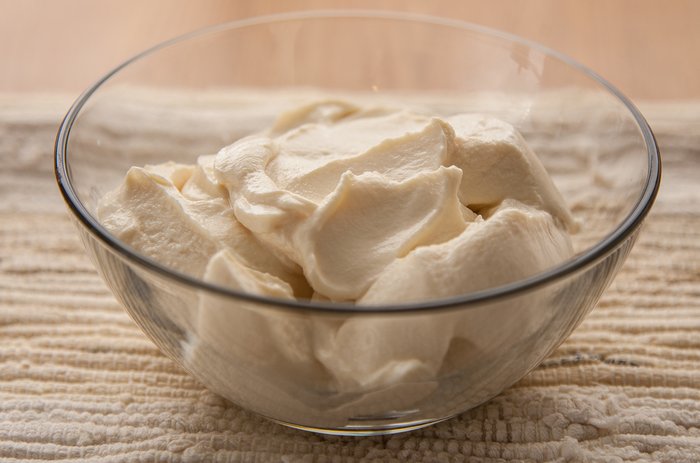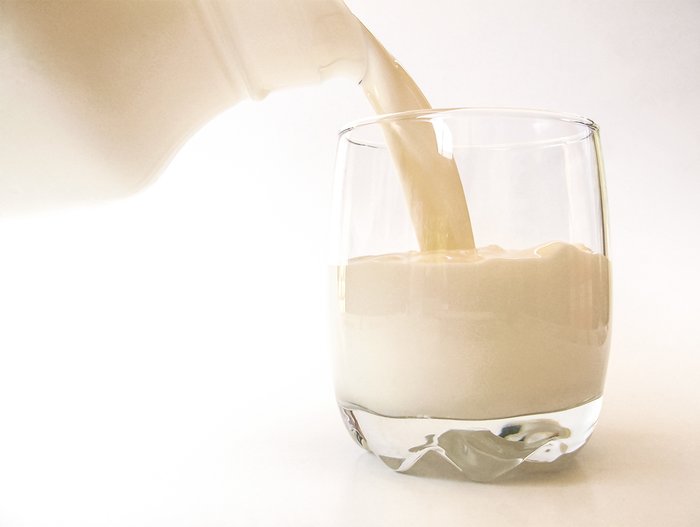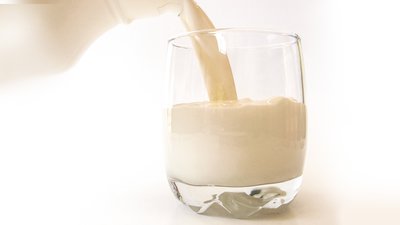Whether you're training to gain, lose, or improve strength and performance, you've got allies in the dairy section of the grocery store. And unlike 20 or so years ago, there are plenty more options than just milk and cheese. The modern dairy case also usually contains a wealth of flavors and choices like:
- Greek yogurt
- Cottage cheese
- Ricotta cheese
- Goat milk and cheese
- Lactose-free milk and yogurt
- Quark
- Kefir
Each of these—and the old standbys of milk and cheese, of course—offer serious benefits to the hard-training athlete or aspiring lifter.
Protein By The Cup
Sure, your whey shake has a lot going for it, but it works best when you already have a sound nutritional foundation in place. Dairy products can help lacto-ovo vegetarians and meat-eaters alike hit their protein numbers without breaking the bank.
There's a good reason why so many dairy products made our Ultimate List of 40 High-Protein Foods. One cup of cow's milk contains 8 grams of protein, and one cup of Greek yogurt contains anywhere from 16-25 grams. Ricotta and cottage cheese also offer a wallop, which is why they've been the secret weapons of athletes since time immemorial.

Dairy is an excellent source of protein because it contains an 80/20 blend of casein and whey protein.
While there's a great case for sometimes taking whey or casein alone—usually post-workout or before bed, respectively—milk-based products offer both proteins, making them a great addition to a recovery snack or meal at any time during the day. Plus, protein powder in milk or yogurt beats the same powder in water every time.
Nutrient-Rich, Yet Customizable By Calorie
Beyond the protein-packed goodness of dairy, it's also rich in calcium and vitamin D, both of which are beneficial for your exercise endeavors. Calcium plays a major role in bone health and muscle contraction, whereas vitamin D plays a major role in bone health, strength, and immune function.[1-3] Furthermore, dairy is rich in immune-boosting proteins, such as beta-Lactoglobulin and alpha-lactalbumin.[4,5]
Looking to boost your probiotic intake? Try kefir, yogurt, labneh (a thick, delicious middle-eastern strained yogurt), or quark. And if you're looking to get lots of nutrition without lots of calories, you can choose lower-fat varieties of almost every dairy product out there.
Bolsters Fat-Loss Efforts
Dairy has been shown to have a major impact on weight loss, too. One reason is related to the fact that dairy is an excellent source of calcium, and there has been an established link between low calcium levels among obese populations.[6]
A study published in Obesity split overweight subjects into two groups: One group consumed one serving (about 8 ounces) of dairy per day, while the other group consumed three servings. During the first phase of the study, subjects maintained their usual exercise and diet habits. During the second phase, each was placed in a 500-calorie deficit to promote weight loss.

Adequate calcium intake has been shown to have a positive impact on body composition.
Subjects eating three servings of dairy per day lost significantly more weight during both the first and second phase of the study. They also lost significantly less lean body mass (muscle) compared to the low-dairy group throughout both phases.
Researchers suggested that the increase in daily calcium played a major role at mitigating weight gain, and that vitamin D played a potential cortisol-suppressant role, which helps to further reduce body fat. Additionally, they attributed the minimal muscle-mass loss to the high branched-chain amino acid content that dairy contains.
There's Something For Everyone
Lactose intolerant? Try a lactose-free milk or yogurt to still reap the benefits dairy products have to offer. There are a growing number of brands to choose from. Consider trying regular Greek yogurt, too, as it contains less lactose that many types of milk or cheese.
And if you'd prefer to skip dairy products altogether, don't have a cow. There are multiple cow's milk alternatives readily available!
References
- Flynn, A. (2003). The role of dietary calcium in bone health. Proceedings of the Nutrition Society, 62(04), 851-858.
- Berchtold, M. W., Brinkmeier, H., & Müntener, M. (2000). Calcium ion in skeletal muscle: its crucial role for muscle function, plasticity, and disease. Physiological Reviews, 80(3), 1215-1265.
- Dahlquist, D. T., Dieter, B. P., & Koehle, M. S. (2015). Plausible ergogenic effects of vitamin D on athletic performance and recovery. Journal of the International Society of Sports Nutrition, 12(1), 1-12.
- Sandstrom, O., Lonnerdal, B., Graverholt, G. & Hernell, O. (2008). Effects of alpha-lactalbumin-enriched formula containing different concentrations of glycomacropeptide on infant nutrition. American Journal of Clinical Nutrition, 87(4), 91-98.
- Hernandez-Ledesma, B., Recio, I. & Amigo, L. (2008). b-Lactoglobulin as source of bioactive peptides. Amino Acids, 35, 257-265.
- Zemel, M. B., Richards, J., Milstead, A., & Campbell, P. (2005). Effects of Calcium and Dairy on Body Composition and Weight Loss in African-American Adults. Obesity Research, 13(7), 1218-1225.

